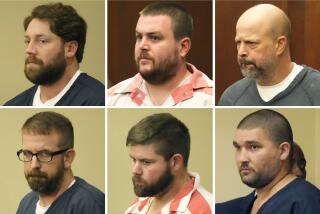Olen Burrage dies at 82; suspect in slayings of Mississippi civil rights workers
Olen Burrage, a farmer and Ku Klux Klan member who owned the Mississippi land where the bullet-riddled bodies of three civil rights workers were found buried in the 1960s, has died. He was 82.
Burrage, who was acquitted on civil rights charges related to the murders, died March 15 at a medical center in Meridian, Miss., the McClain-Hays Funeral Home announced. The cause was not released.
The Ku Klux Klan slaying became one of the most infamous episodes of the civil rights era and led to the 1965 passage of the Voting Rights Act, which outlawed discriminatory practices that kept African Americans from voting.
PHOTOS: Notable deaths of 2013
When the state refused to bring murder charges, the federal government stepped in. The FBI dubbed the investigation “Mississippi Burning,” which was later used as the title of a 1988 movie loosely based on the crime.
The murdered men — Andrew Goodman, James Chaney and Michael Schwerner — all in their early 20s, were freshly trained in voter-registration techniques when they drove into Philadelphia, Miss., on June 20, 1964.
When they were arrested the next day by the sheriff and released after dark, their station wagon was overtaken by a group of men on a rural road. The three workers were severely beaten before they died.
When their bodies were found under an earthen dam on his property, Burrage said he had no idea who would have wanted to kill the young men or how the bodies got there, according to a 1964 article in The Times.
But a 1964 confession to the FBI by Klansman Horace Doyle Barnette, who was convicted in the killings, contradicted that account.
Barnette said Klansmen drove the bodies to a remote location in a 1963 Ford station wagon and met up with Burrage, who directed them to the dam on his farmland.
“Burrage got a glass gallon jug and filled it with gasoline to be used to burn the 1963 Ford” used to transport the bodies, according to Barnette. He also said Burrage proposed using one of his trucking company’s diesel trucks to pick up the men who would carry out the burning because “no one will suspect a truck on the road” so late at night.
An FBI agent read Barnette’s confession to the jury during the 1967 trial of Burrage and 17 other men on charges of conspiring to violate the civil rights of the three dead men. Burrage was one of eight men acquitted.
The jury deadlocked on charges against a local minister, Edgar Ray Killen, accused of orchestrating the killings. He was charged again in 2005 with killing the three men and convicted on three counts of manslaughter by a state court. Killen is serving a 60-year prison sentence.
Civil rights groups, family members of the victims and other groups have continued to push Mississippi to pursue criminal charges against the original suspects in state court. But they are running out of time. Among the original 18 indicted, only Pete Harris — identified in testimony as a Klan leader — is still alive.
An informant had told the FBI that Burrage had bragged in the days before the killings that his dam would hold plenty of “invading” civil rights workers — a piece of information that caused observers to speculate that retrying Burrage provided the best chance of another conviction in the case.
Norma Bourdeaux, who was on the federal grand jury that indicted Burrage in the 1960s, told the Clarion-Ledger newspaper in Jackson, Miss., that she believed he was guilty.
“A man who has a piece of property doesn’t generally have people come in, take a bulldozer and bury three bodies under a dam,” she said, “unless he knows about it.”
Olen Lavelle Burrage was born March 16, 1930, in Neshoba County, Miss., and lived most of his life there.
In the 1950s, he served in the Marines as a truck mechanic and later began a successful trucking business, which he sold in 1990.
Burrage is survived by his wife of 62 years, Ruth; three children; four siblings; and many grandchildren and great-grandchildren.
More to Read
Start your day right
Sign up for Essential California for the L.A. Times biggest news, features and recommendations in your inbox six days a week.
You may occasionally receive promotional content from the Los Angeles Times.




